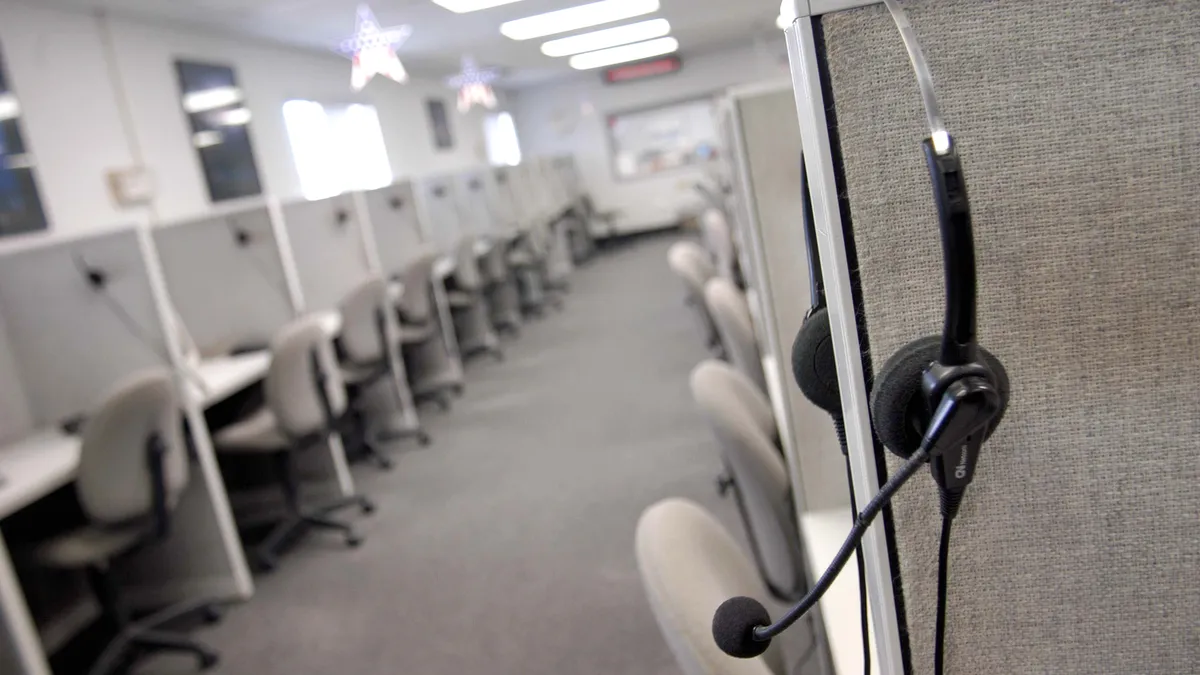Candidates have perhaps come to expect panel interviews but group interviews — wherein recruiters assess multiple candidates at the same time — are an entirely different beast. From the potential hire perspective, the intimacy (or illusion) of individualized attention is shattered.
Many just don't like them. Take this Twitter thread for example, where words like "demoralizing," "failed groupthink activity," "horror" and simply "ew'' have been used to describe group interviews. Some compared it to speed dating; others likened it to the employment version of the Hunger Games. Others still tweeted their outrage that lazy competition will simply piggyback off of stronger candidates' answers.
So, why would any HR department set up a meeting with multiple contenders? HR Dive spoke to a few HR professionals about the benefits of this hiring process and best practices to help them go smoothly.
The main takeaway: These collective questionings are a quick way to determine how quickly talent can think on their feet, as well as company compatibility.
"You stand a better chance of seeing who functions best as part of the team and might be a good fit within your corporate culture. In addition, group interviews save time and money as well," said Trey Barnette, regional vice president at staffing firm Robert Half. He's seen multiple candidates vie for a single open role through group interviews, as well as employers hoping to fill several vacancies with them.
Michael Alexis, CEO of teambuilding.com, told HR Dive that the event planning company has made more than 300 hires in the past year and relied on this assessment format extensively. "These group interviews are a helpful proxy for company-culture fit. We are generally a social bunch of friendly, caring, conscientious people. Seeing how candidates interact with each other can be a clear sign of whether they will fit in with our current staff," Alexis said.
"Group interviews actually allow for dynamics and skill observation that are extremely relevant to the role," he added. "For example, we hire event hosts and co-hosts, and the group interview is a chance for these individuals to practice scripts and other mechanisms with a real audience."
In Barnette's experience involving sales, group interviews are structured around a collaborative sales project. Job candidates put their heads together on a marketing campaign and its rollout, to be presented to the interviewers.
"A lot of times what comes out of that is like Darwin's evolution. You see who the lead person is, because then they'll become the leader of the group, galvanizing the entire team. Or you might see the reverse — who's being quiet, who's not interacting, who kind of keeps to themselves, and who potentially wouldn't [contribute to] a team atmosphere."
Of course, interviewers also have to stay quick on their feet. "Observe the candidate's manner, appearance, eye contact and responses during the Q&A session," Barnette advised. Doing so will help keep track of who is confident in their knowledge or, at least, who is comfortable speaking in front of a group.
Ubaldo Ciminieri, co-founder of interview platform InterviewIA, said setting up clear-cut criteria ahead of time will help interviewers keep their observations straight. Ability to do the job, alignment to company culture and mission, and growth potential are three sample criteria Ciminieri suggests keeping at the forefront.
He also advised that all evaluations and feedback be written down in real time by every interviewer. "Do not let time pass between the interview and gathering and evaluating their notes. This helps mitigate recall bias," Ciminieri told HR Dive.
"Any type of interview can be effective and meaningful when structured appropriately and aligned to exactly what your company needs in every role," Ciminieri added. "With this structured process in place, employers can easily defend their processes and make the right hires, every time."
Barnette also emphasized the importance of an airtight group interview structure: The key to success is time constraints, as well as someone to proctor or observe the potential hires. "I wouldn't necessarily leave the people to themselves to solve the [problem] because they're brand new, random to each other. And honestly," Barnette said, "they're probably either caught off guard if you don't prepare them for the group interview. So structure is just paramount."
In regard to disclosure, Barnette has seen it both ways — both HR professionals who give potential hires a heads up and those who spring mass interviews on candidates. Why do recruiters do that?
"I would say it's definitely for them to think quickly on their feet, but also to see how they naturally respond to other people. One thing we've learned post-pandemic is some people have been away from the environment of working with people. Some people have been pretty much siloed for the last year and a half," he said. "So they've got to recalibrate themselves with how they're going to interact with that environment and that team."
Correction: An earlier version of this story misspelled the name of Trey Barnette, regional vice president at Robert Half.





















